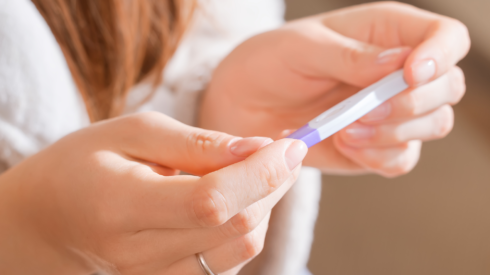Last updated on July 9th, 2024 at 02:11 pm
I’d bet that starting when you announced your pregnancy, you’ve heard endless stories about the dreaded glucose tolerance test or gestational diabetes test. You know the one that you fast prior to drinking a super sugary drink and then have to get your blood drawn? Definitely not a favorite in my book.
This, however, is a super important test for the health of you and your baby throughout the last trimester of your pregnancy. So how can you make the test more bearable? And what can you do to prepare beforehand to minimize the discomfort?
Well, my friend, you have come to the right place! We are going to talk about all this gestational diabetes test; what it is, how you can prepare, and what the results mean for you.
Disclaimer: This post may contain affiliate links. If purchases are made through these links, I may receive a small commission at no additional cost to you. Thank you for supporting this site.
What is the Glucose Tolerance Test?
During the end of your second trimester, usually about 28 weeks pregnant, your doctor will screen you for gestational diabetes (also known as GDM). Gestational diabetes while treatable, can be very serious for the health of you and your baby so diagnoses is very important. This is accomplished through the glucoses tolerance test.
Depending on your provider, you may be asked to fast overnight prior to the test. If this is the case I highly recommend scheduling your appointment for as early in the morning as possible to avoid an empty stomach for too long. We all know how hunger and pregnancy do not mix!
I personally was just asked to eat a breakfast that did not contain any carbs (like eggs and bacon). I’ve found this policy really varies depending on your provider so make sure you clarify with them prior to the test to avoid having to retake it!
Then you will be asked to drink a drink containing 50 grams of glucose within a 10-minute period. It is important that you drink it all within this time to ensure accuracy of the test.
If given the option, the flavors are typically orange, lemon-lime, or fruit punch. I know plenty of people have strong feelings about each flavor, but it likely all chalks up to personal preference. I had the orange drink and to me it just tastes like flat, very sugary orange soda. It wasn’t terrible, but not great by any means.
The purpose of this test is to see how your body responds to a high amount of glucose and if this effected by your pregnancy.
After 1 hour, your blood will be draw and blood sugar tested. Depending on what your blood sugar is at this time, you will either pass and need no follow up or fail and potentially have to take the 3 hour test. The results come relatively quick, so if you haven’t heard from your provider after a few days feel free to call them and check on your results.

What Happens If You Fail the 1-hour Glucose Tolerance Test?
If you failed the first test, regardless of by what margin, your provider will recommend you take the 3-hour Glucose Tolerance Test. This test is performed exactly as above except the drink will contain 100 grams and your blood will be drawn after each hour. This time your provider will look at the levels for each of the three-hour increments to determine if you have gestational diabetes.
This test will for sure require you to fast ahead of time so be prepared! And schedule your appointment for absolute earliest you can! All you can have aside from the test drink is water during the entire three hours of testing.
After the third hour blood draw you are free to eat whatever so make sure you bring a snack with you in your bag! Your provider will then look at the blood sugar results for both fasting and each of the hour blood draws to determine if you have gestational diabetes.
Tips to Pass the Glucose Tolerance Test
Really there isn’t much you can do to “make sure you pass” this test. You either have gestational diabetes or you don’t. And if you do it is really important to your health and the health of your baby that you know about it so it can be treated properly.
So don’t think I am out here to give you ways to cheat the test! There are things you can do to ensure the test goes smoothly for you and your results are accurate.
If you are allowed to eat ahead of time, make sure that you avoid carbs and sugar. If you consume anything with sugar ahead of time this can throw off your results.
This is also why I suggest taking the test in the early morning if possible. That way all you have to do is eat a small breakfast, take you test, and you are good! Or if you are required to fast ahead of time then you aren’t without food for very long. If you haven’t already learned, pregnancy and an empty stomach do not mix well at all!
It is not uncommon for some people to get nauseated and lightheaded during the test. Not surprising after consuming that much sugar in a short amount on time! It can be hard, but DO NOT VOMIT! This is an automatic fail and you will have to redo the test. No fun! I personally didn’t get nauseated until the last maybe 5 minutes of the test, but I have heard of plenty of people being sick sooner. So be prepared just in case with a barf bag.
Also make sure you bring a water bottle and a snack for afterwards. As soon as your blood draw is over you can eat so I would have a granola bar or something at least in your bag ready to go. Then if you are like me treat yourself to a nice breakfast/lunch date afterwards!
Overall, the Glucose Tolerance Test doesn’t have to be this big, scary test like many make it sound like. Will it be uncomfortable? Probably. Will you get nauseous? Potentially. But will you make it through it? Absolutely!
This is an important test for the health of you and your baby so it should be taken seriously, but don’t stress! You can do hard things mama. You’ve made it this far through pregnancy right?
Looking for more info? Check out my Guide to Gestational Diabetes for more tips and tricks!



